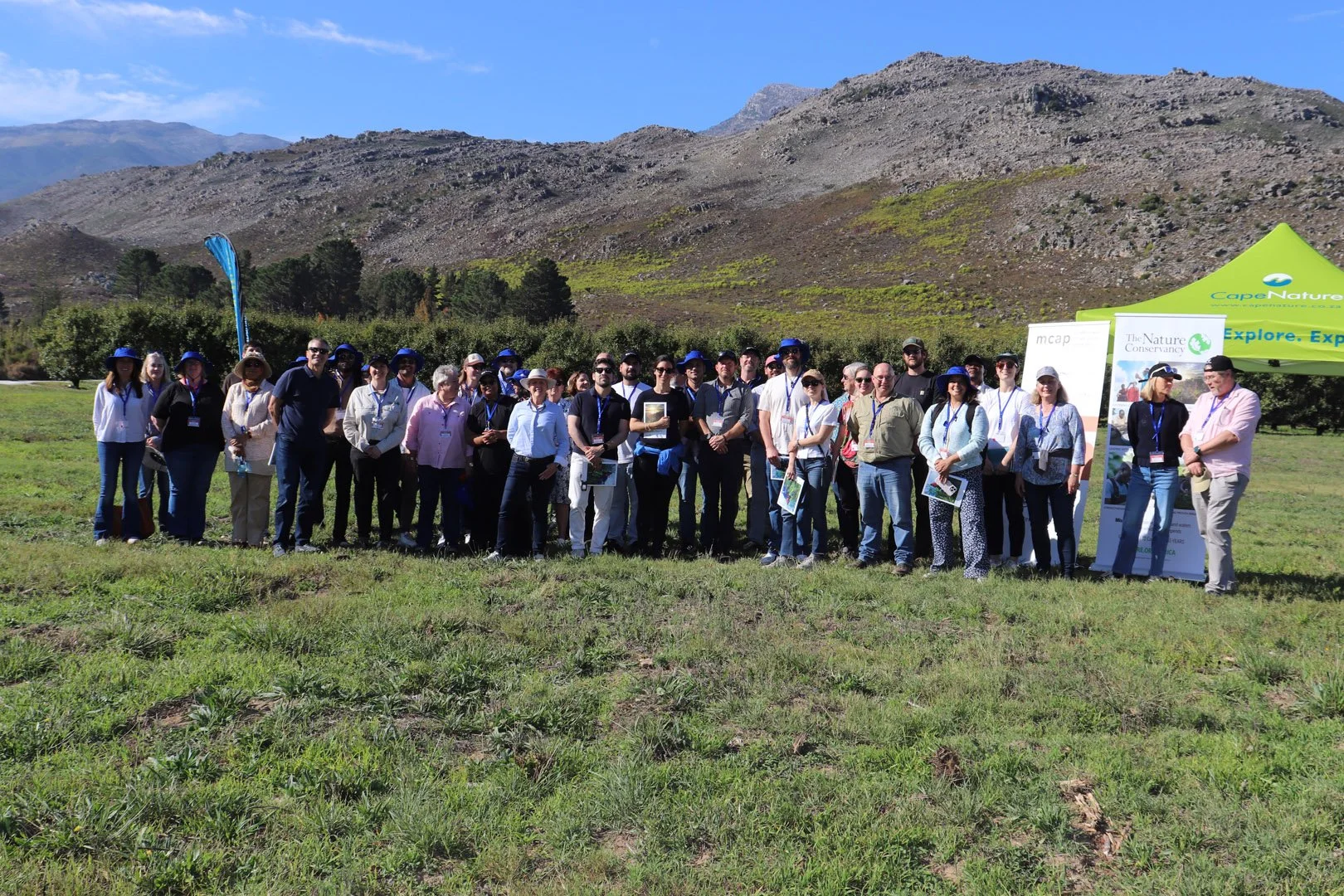
2nd MCAP Annual Convening
Western Cape, May 6 - 9, 2025
The Government of Western Cape and MCAP Secretariat were delighted to welcome MCAP regional government leaders and participants of the Mediterranean Climate Action Partnership (MCAP) to Western Cape, South Africa for MCAP’s Annual Convening held from May 6-9, 2025.
This second global gathering offered an opportunity to share promising practices from your MCAP member regions and learn from peer leaders facing similar climate risks at the nexus of drought, extreme heat and wildfire, all while advancing the collective agenda outlined in the MCAP Action Agenda and 2024 Work Plan. Across our three days together, the region of Western Cape served as an informative and engaging ‘living laboratory’ from which members took inspiration to collaborate on new solutions.

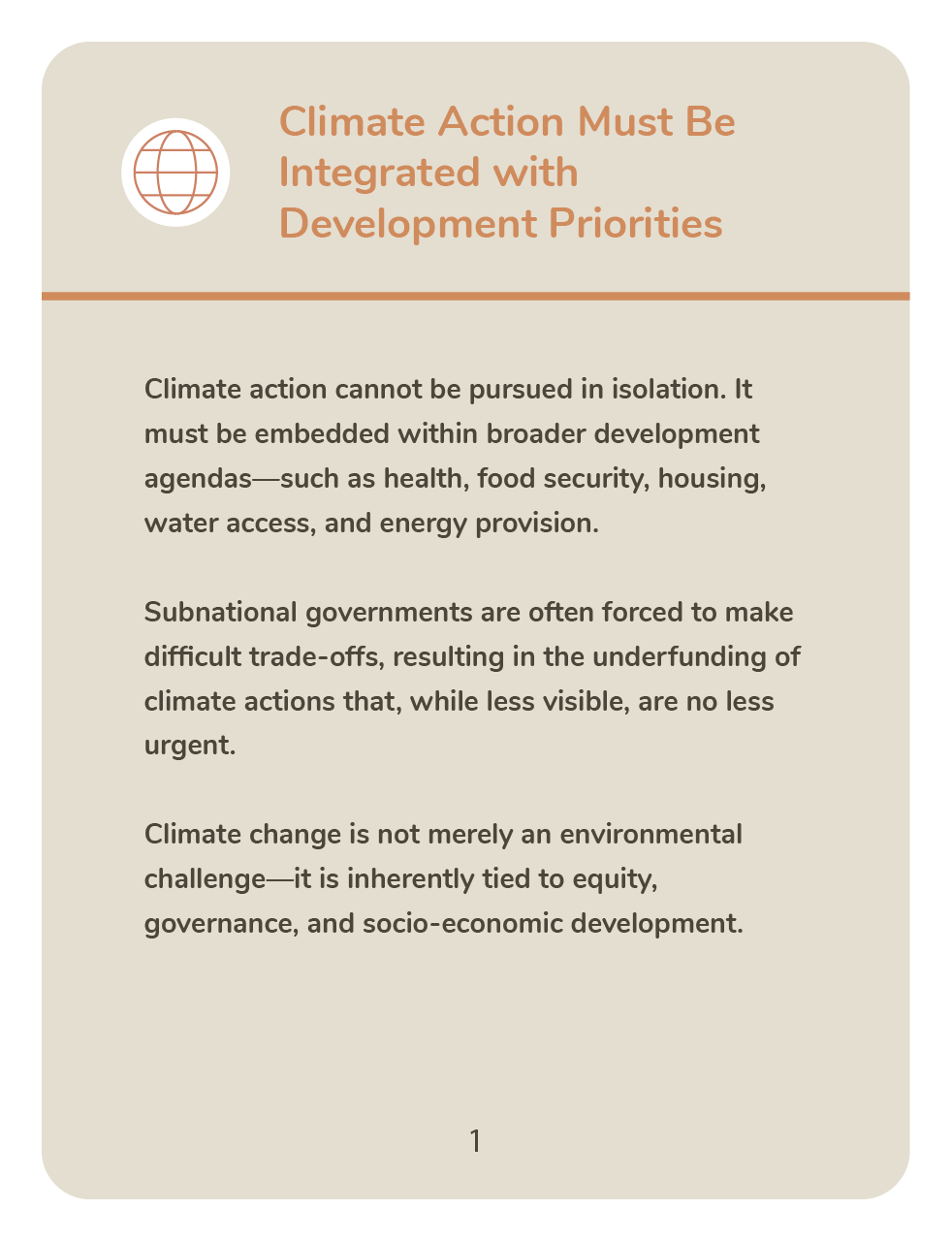



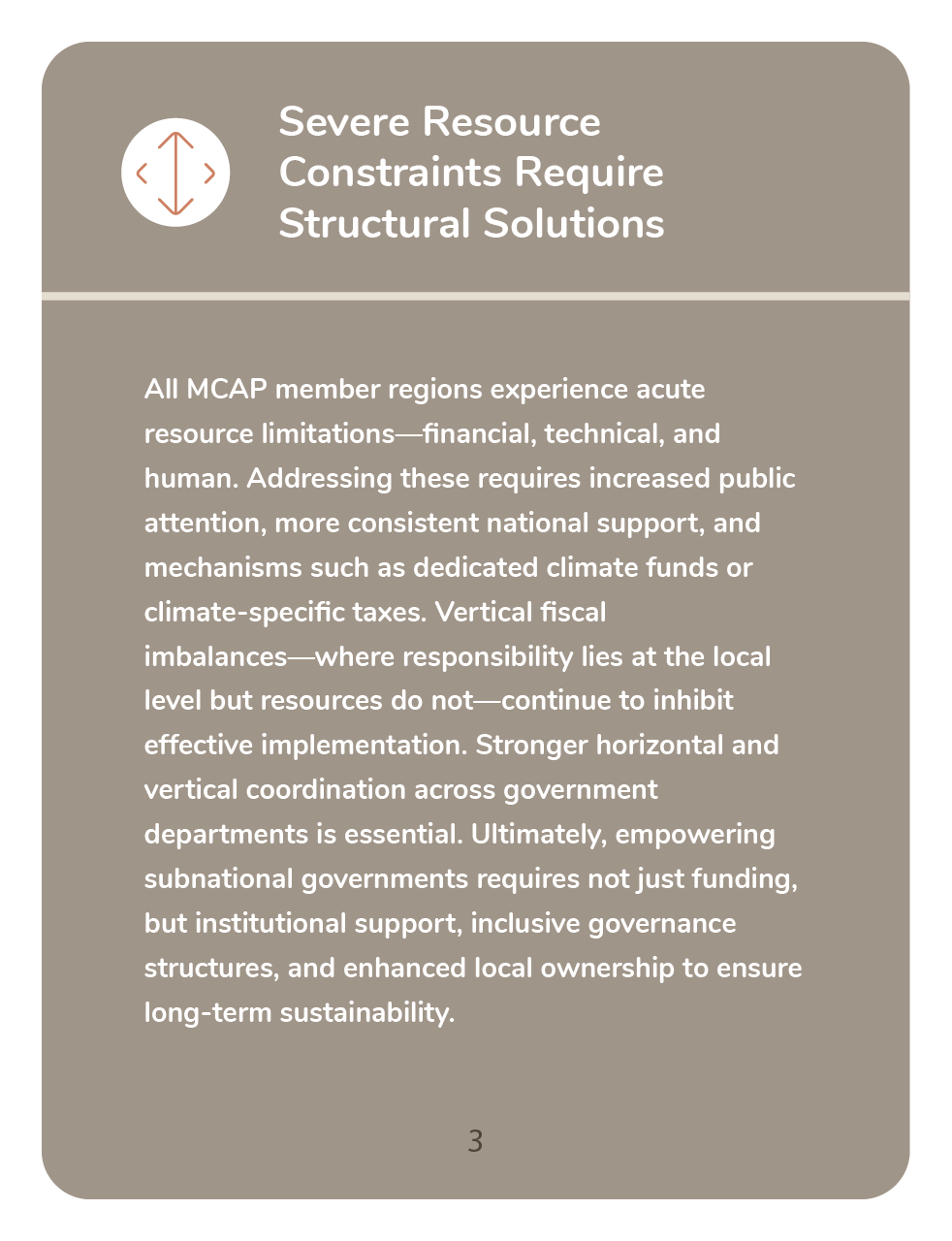

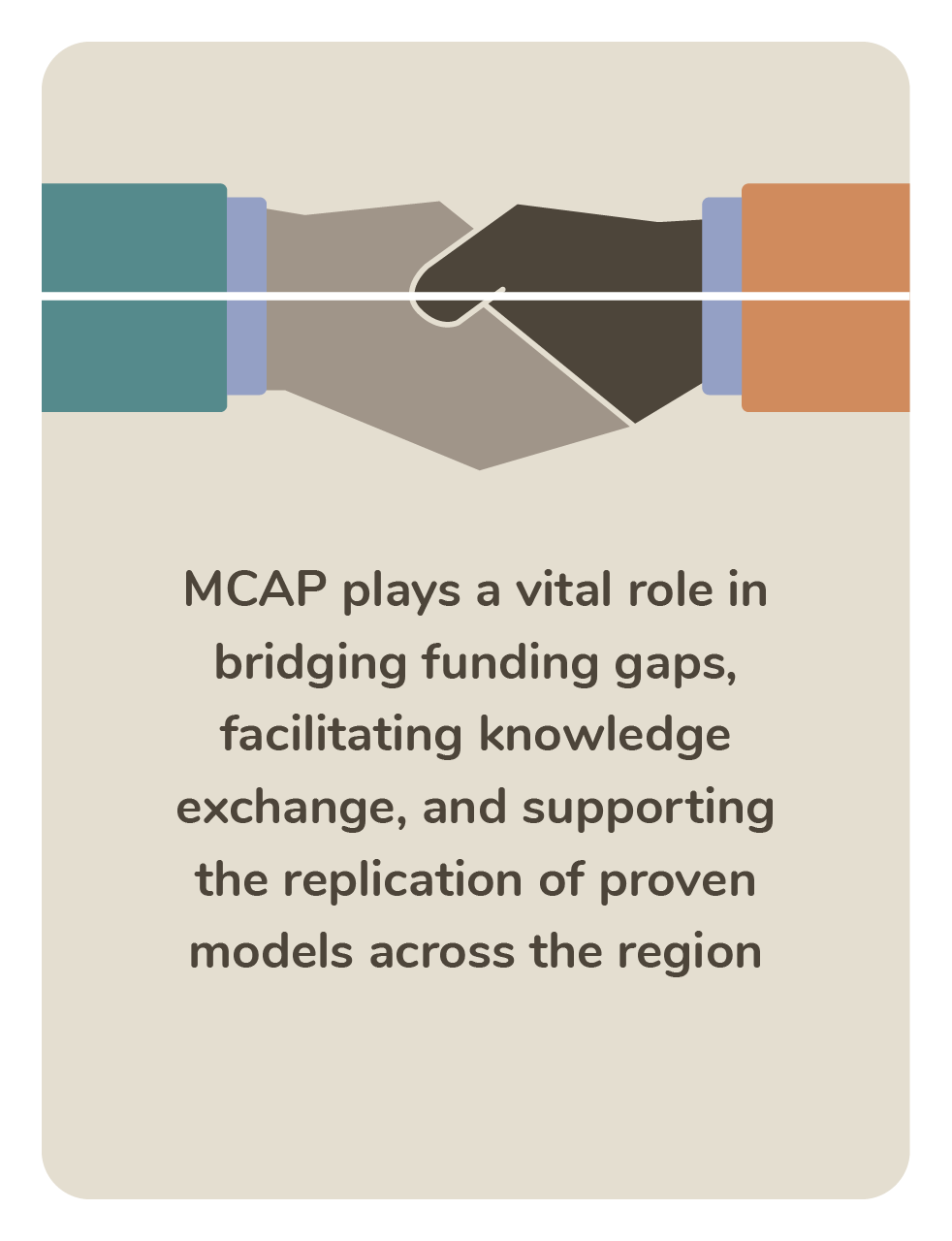
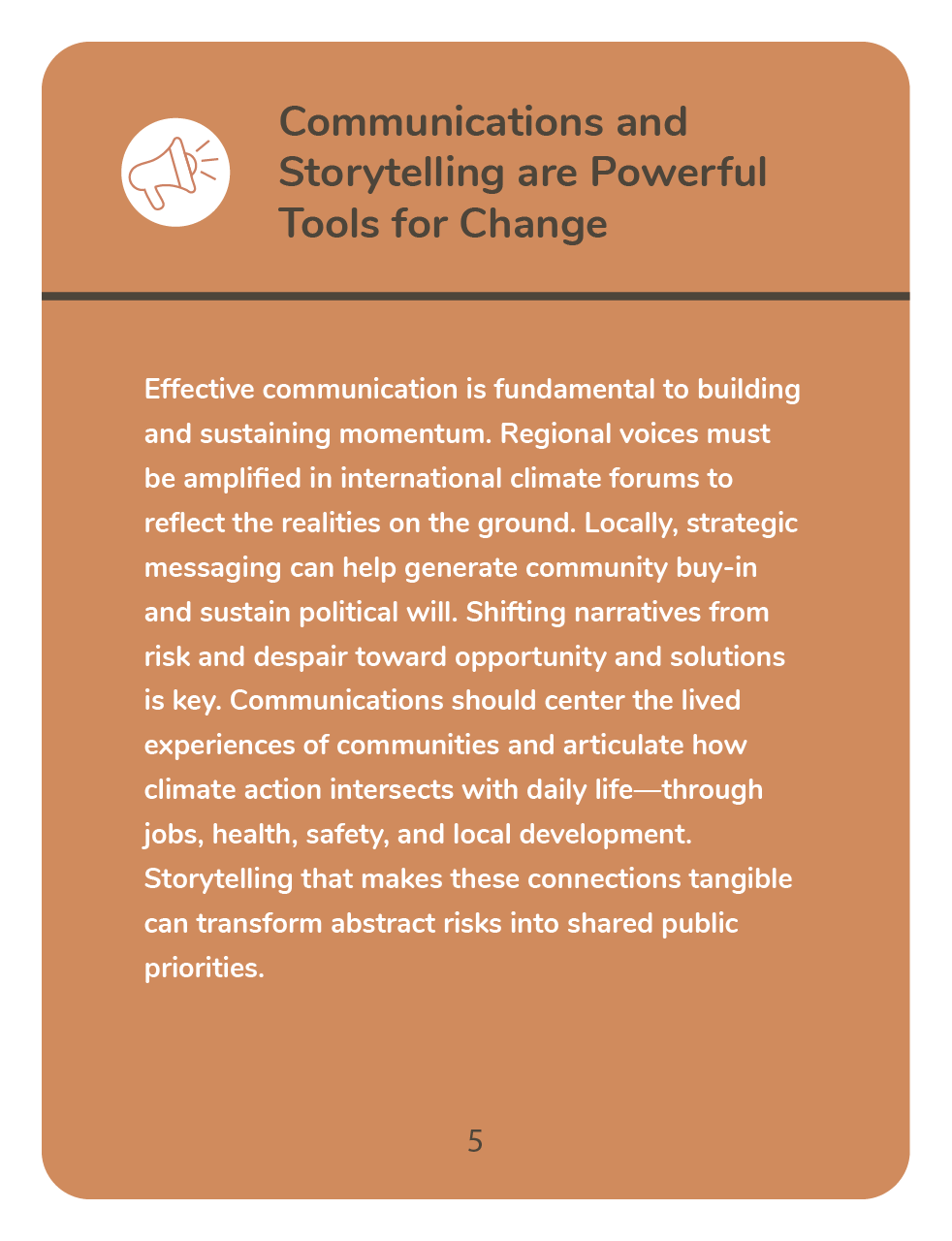

SUMMIT HIGHLIGHTS
Western Cape as a Living Lab
The Western Cape Living Lab immersed MCAP members in the region’s resilience story—highlighting its climate risks, innovative solutions, and key local actors. Through site visits and discussions in Stellenbosch, Jonkershoek, and the Berg River Valley, participants explored projects addressing drought, extreme heat, and wildfire. The experience showcased diverse, on-the-ground approaches and uplifted local leaders driving change. It also offered inspiration and practical insights for MCAP members to apply in their own regions.
Site 1:
Berg River Dam
Developing integrated water resource management in a stressed strategic catchment
The site visit explored the role of the dam within the Western Cape Water Supply System (WCWSS), highlighting its integration of engineered and nature-based solutions for managing a stressed catchment. Key topics included the dam’s historical significance, ecological restoration efforts, water resilience during the Day Zero drought, and perspectives from local water users.
Site 2:
The Water Hub
Exploring nature-based solutions for innovations in water filtration and pollution reduction
This site demonstrates innovative, nature-based approaches to treating and reusing polluted water in rapidly urbanizing areas with limited resources. It also features low-tech cooling solutions designed to improve living conditions in informal settlements.
Site 3:
Amandel River Burn Site
Testing prescribed burn practices and invasive species management in wildfire prone landscapes
This site showcases a proof-of-concept prescribed burn for managing invasive alien trees and reducing wildfire risk to improve water security. It highlights integrated fire management tools as part of broader catchment restoration efforts.
Site 4:
Paul Clüver Family Wines
Building climate resilience in export-oriented fruit and wine production
This visit highlighted the private sector’s proactive role in building climate resilience in the export-oriented fruit and wine industries, which face increasing risks from heat, drought, wildfires, and pests. Farmers and industry groups are investing in research, technology, and partnerships—guided by the SmartAgri Plan—to drive adaptation, sustainability, and social development.
MCAP Regions in Action:
Mini-Sprint Project Acceleration Session
After a three-month “Mini Sprint” to spur project acceleration and collaboration, nine cross-regional teams submitted project proposals to be considered for funding and added capacity support, from the MCAP Secretariat thanks to the generosity of the Moore Foundation. Ultimately, three projects were selected to advance key priority actions around Extreme Heat, Wildfire, and Drought, with the ambitious goal of generating meaningful progress by and beyond COP30.
During the Annual Convening, each selected project was able present the details of their work and receive expert feedback to better refine their work plans and outcomes. Through this session, the MCAP Secretariat also worked to identify opportunities for building a learning agenda for all MCAP member regions. The session was also helpful to connect regional leaders with a focused agenda around the projects, motivating other non-participating regions to join the efforts in low-effort, high-impact capacities.
Through this process, MCAP seeks to building a robust pipeline of implementation-ready projects, deepen cross-regional partnerships, and showcase climate action in MCAP member region through tangible milestones and universal lessons learned. The Annual Convening in Western Cape served as a pivotal moment to celebrate, reflect on, and enhance the three selected Mini-Sprint Projects.
The Selected Projects:
Regional Heat Island Monitoring and Prediction Tool
The Regional Heat Island Monitoring and Prediction Tool developed by Santiago Metropolitan Region, Western Cape Province & California aims to create and implement digital collaborative tools for monitoring, predicting, and mitigating the urban and rural heat island phenomenon, fostering cooperation among regions with different levels of expertise in this field.
Water Management Practices Through Coastal Wetland Resilience
The Water Management Practices Through Coastal Wetland Resilience developed by Catalonia, Western Cape Province and Central Greece aims to enhance ecosystem resilience using these regions as testing grounds for innovative hydrological management, nature-based solutions, and collaborative governance.
Wildfire Spatial Planning, Risk And Biodiversity Prioritization System
The Wildfire Spatial Planning, Risk And Biodiversity Prioritization System developed by Western Cape Province, Catalonia, and New South Wales seeks to create a comprehensive approach to managing intensified fire-related risks posed by woody plants, habitat and biodiversity changes with a focus on creating responses that prioritize biodiversity and socioeconomic improvements.
MCAP Timeline of Events
May 2025
Capetown Project Mini-Sprint Workshop
May-November 2025
Project Mini-Sprint Development
May 2025
Biodiversity & Project Launch led by Catalonia
May 2025
Funding Commitment announcements for MCAP Partnership from Santiago, Catalonia and Tangier
June 2025
MCAP Newsletter Launch
June 23-26, 2025
London Climate Week
July 24-26, 2025
Smart City Expo Santiago
September 2025
Quarterly MCAP Newsletter
Sept 21-28, 2025
NYC Climate Week
Oct 9-15, 2025
IUCN World Conservation Congress in Abu Dhabi
Nov 10-21, 2025
COP30 in Belem
December 2025
Quarterly MCAP Newsletter
May 6-9, 2025
Annual Convening hosted by the Western Cape, South Africa
June 3, 2025
Launch of MCAP WhatsApp
June 17, 2025
Leadership Council Meeting
Decisions made on (re)appointment of co-chair, sustainability plan, consideration of new members, and announcement of request for of interest in hosting 2026, 2027, and 2028 annual convening.
October 2025
Fall Leadership Council Meeting (date TBD)
Annual Convening Attendees
-
[image|Alvaro Rojas|https://images.squarespace-cdn.com/content/6555d0a1edbe734fd718028a/233cd805-6c3a-4d03-9c77-3e511c0b2f72/mcap-_0007_Headshot+Alvaro+Rojas+-+Alvaro+Rojas+Monje.jpg]
Head of Planning and Regional Development Division, Regional Government of Biobío
Born in Concepción, Region of Biobio, where i´ve lived all my life. Most of my career has been in public institutions, although I have also worked in private companies.
-
[image|Wade Crowfoot|https://images.squarespace-cdn.com/content/6555d0a1edbe734fd718028a/9e208e61-545e-4ebb-8cea-c2d8f8bc930f/mcap-_0035_2021_09_07_KG_0938_Crowfoot_portrait+-+Kimberly+Arbuckle.jpg]
Secretary, California Natural Resources Agency
Wade Crowfoot was appointed California Secretary for Natural Resources by Governor Gavin Newsom in January 2019. Secretary Crowfoot oversees an agency of 19,000 employees charged with protecting and managing California’s diverse resources. As a member of the Governor’s cabinet, he advises the Governor on natural resources and environmental issues.
Crowfoot brings over two decades of public policy and environmental leadership to the office, with expertise in water, fisheries, climate and sustainability issues. He most recently served as chief executive officer of the Water Foundation, a nonprofit philanthropy that builds shared water solutions for communities, economy, and the environment across the American West.
Prior to joining the foundation, Crowfoot served in Governor Jerry Brown’s Administration as deputy cabinet secretary and senior advisor to the Governor. In that role he led the administration’s drought response efforts and spearheaded several of the Governor’s priority initiatives to build California’s resilience to climate change.
Crowfoot received a bachelor’s degree in political science from the University of Wisconsin-Madison in 1996 and earned a master’s degree in public policy from the London School of Economics in 2004, where he graduated with honors.
-
Jenn Phillips serves as Assistant Secretary for Climate Change at the California Natural Resources Agency. She helps lead the Agency’s work on climate adaptation, nature-based solutions, and international engagement. She was formerly a senior policy advisor with the U.S. Climate Alliance, where she supported a bipartisan coalition of U.S. states on their resilience and natural and working lands policy priorities. Prior to that, Jenn worked in the California Governor’s Office of Planning and Research (OPR) as a senior scientist on climate and at the California Ocean Protection Council (OPC) and led OPC’s work on sea level rise. Before moving to California, Jenn was a Knauss Marine Policy Fellow and key staff to the NOAA Administrator in Washington, D.C. She received her master’s degree from the University of Wisconsin-Madison and a bachelor’s degree from Cornell University.
-
Sonsoles Letang is Director General for Climate Change and Environmental Quality for the Government of Catalonia. She has worked many years in the fight against climate change and for environmental sustainability, in both government institutions and the higher education and academic field. She also co-owns a large horse farm called La Corona Residencia Equina and is an advocate for rural areas and is proud to be part of the agroforestry community.
-
Max Antoine Massanet i Palacios is the Foreign Action Coordinator for the Department of Territory, Housing, and Ecological Transition in the Catalonian Government. He previously worked as a delegate for the Catalonia government abroad and as a consultant for a variety of telecommunications companies and. He has a background in political sciences and international affairs.
-
[image|Marc Vilahur|https://images.squarespace-cdn.com/content/6555d0a1edbe734fd718028a/aac155d4-78fb-4f41-87f7-d26e13184339/mcap-_0009_1737203465700+-+ELENA+MARCO.jpg]
Director General of Environmental and Natural Environment Policies, Government of Catalonia
Environmental policies must be the foundation of our future society. My professional life has been closely linked to the environmental third sector and the public management of environmental policies. My work experience in these fields has given me a holistic perspective and the transversality necessary to understand the socio-environmental needs arising from the global environmental emergency. My mission is to work to transform policies and focus our society on fair, sustainable development that takes into account social equity. Our collective challenge: to adapt our societies to ensure the conservation of our planet and the prosperity of future generations.
Weiner has advised over 50 Members of Congress and the California Legislature on energy, natural resources, and wildfire policy. He previously served as Chief of Staff to California State Senator Henry Stern, managing his response to the historic Thomas and Woolsey Fires, served as an energy and climate advisor to Congressman Henry A. Waxman and has held roles with the House Energy and Commerce Committee and the House Committee on Oversight and Government Reform.
His experience working in Congress convinced him that the megafire crisis was solvable. He started Megafire Action in 2022 to build out the dedicated policy formulation and advocacy capacity required to help enact policy solutions that meet the scale and urgency that the crisis demands.
-
[image|Konstantinos Meletis|https://images.squarespace-cdn.com/content/6555d0a1edbe734fd718028a/f3159c19-073e-4610-a62c-ee1158d75bcf/mcap-_0011_%7B3A46D9F1-C3F5-49D7-8ACC-C3EA42AA857B%7D+-+Socrates+Boutsis.jpg]
Regional Councilor of the Region of Central Greece
-
[image|Patrizia Bianconi|https://images.squarespace-cdn.com/content/6555d0a1edbe734fd718028a/c02933e2-a183-45e3-b207-b4242b26294a/mcap-_0031_Bianconi+foto+-+Patrizia+Bianconi.jpg]
Senior Expert in Ecological Transition and Climate Change, President's Cabinet
Delegate for the Emilia-Romagna region for ecological transition and integrated climate change policies, she is a senior expert with extensive experience in managing projects and programs focused on sustainable development and climate change at international, national, and regional levels. With over 30 years of professional experience, she has actively promoted local economies and facilitated territorial cooperation while implementing and coordinating research activities related to climate change. She has supported numerous public institutions beyond the Emilia-Romagna region, including the Italian Ministry of Environment, the Italian Ministry of University and Research, the National Research Centre, and various private companies. Additionally, she collaborates as a lecturer in several specialized courses and master’s programs organized by universities and environmental agencies. Previously, she performed as the Technical Director at the Regional Development Agency of the Marche Region in Italy.
-
[image|Francesca Martinese|https://images.squarespace-cdn.com/content/6555d0a1edbe734fd718028a/1c2e6c54-7b3d-4fe9-abb2-3c6bc65ee3eb/mcap-_0026_Foto+profilo+ok+-+Francesca+Martinese.jpg]
Head of International Relations, President's Cabinet
An international relations and networking expert. With a master’s degree in public and social communication sciences, and a degree in Interpreting and Communication, she has worked for 23 years at the City of Bologna (Italy) as Head of the International Relations and Projects Office, developing skills in diplomatic relations, city-to-city cooperation, international projects management and funding, networking. Since October 2021 she is Head of International Relations in the President’s Office of Emilia-Romagna Regional Government.
She is fluent in English, French, Spanish.
-
[image|Luca Vecchi|https://images.squarespace-cdn.com/content/6555d0a1edbe734fd718028a/d48c20cf-f0da-4ce0-907e-56d66555d043/mcap-_0027_Foto+busto+Luca+Vecchi+-+Francesca+Martinese.jpg]
Head of the President's Cabinet, President's Cabinet
Luca Vecchi, Head of the President’s Cabinet, Emilia-Romagna Region
He was born in 1972 and graduated in business administration from the University of Modena and Reggio Emilia in 1999.
He has been a member of the Reggio Emilia Institute of Certified Public Accountants and the Register of Auditors since 2003, and for several years he was a certified public accountant.
He was a city councillor of Reggio Emilia from June 2004 to May 2014.
From June 2014 until June 2024, he served as mayor of Reggio Emilia, a role that also allowed him to personally deal with business internationalization and international relations.
During his two terms as mayor, he also served as national welfare delegate for the national association of Italian municipalities (ANCI) and was involved in all major legislative and governmental measures on social and labour policies representing the association of Italian municipalities.
From 2018 to 2021 he was Regional President of the Committee of Local Authorities.
From 2019 to 2021 he was Emilia-Romagna Regional President of ALI (Association of Italian Local Authorities) with national delegation to educational policies.
From 2021 to 2024 he was President of ANCI Emilia-Romagna.
In December 2024 he was appointed Head of the President’s Cabinet at Emilia-Romagna Region.
-
[image|Matthew Riley|https://images.squarespace-cdn.com/content/6555d0a1edbe734fd718028a/980a6872-1227-4cfb-9026-4eebe1079660/mcap-_0001_MattRiley_small+-+Matthew+Riley.jpg]
Matthew Riley is Director, Climate and Atmospheric Science, Science & Insights at the New South Wales Department of Planning, Industry and Environment. He has a proven track record of delivering policy-ready environmental research and services that deliver significant public good. He has delivered multi-million dollar programs in climate change impacts and adaptation, greenhouse gas emissions, air pollution and energy and energy efficiency programs for the NSW Government that have led to significant benefits for the people and businesses of NSW. Matthew leads a team of climate and atmospheric researchers, technicians, programmers and analysts that study and observe the climate, urban air quality and meteorology, greenhouse gas emissions and energy systems of NSW.
-
[image|Chloe Spear|https://images.squarespace-cdn.com/content/6555d0a1edbe734fd718028a/93daccfe-cb6c-4b56-bd38-3bf01c35ad50/mcap-_0003_Image+%281%29+-+Chloe+Spear.jpg]
Department of Climate Change, Energy, the Environment and Water
Chloe has a strong passion for climate action. She joined the climate adaptation policy team last year, after working for the NSW State Emergency Service. In her role as a policy officer, she has worked on the Climate Adaptation Action Plan for NSW as well as monitoring and reporting under the NSW Climate Change Adaptation Strategy. She volunteers with the State Emergency Service which is the combat agency in NSW for storms, floods, and tsunamis. Apart from her public service career, she is a qualified baker and enjoys spending time with animals.
-
Luciano Flores García holds an MSc in Integrated Water Management from the University of Barcelona and a degree in Natural Resources Conservation Engineering from the Austral University of Chile. He currently leads the Water Management Unit at the Regional Government of Santiago, where he coordinates strategic programs and studies aimed at strengthening water security in Chile’s capital. With a strong background in the public sector, he has advised regional and municipal authorities on sustainability, water efficiency, and climate change.
-
Nicolás Silva is a Political Scientist with a minor in Public Policy from the Pontificia Universidad Católica de Chile. Since 2023, he has served as International Advisor at the Metropolitan Regional Government of Santiago, where he contributes to the region’s international positioning and cooperation strategies.
Prior to this role, Nicolás worked as an International Advisor at the International Affairs Office of Chile’s Ministry of Energy, where he supported the ministry’s global engagement and multilateral energy initiatives.
-
[image|Cate Hart|https://images.squarespace-cdn.com/content/6555d0a1edbe734fd718028a/209c65ec-23ac-4e7a-9803-e6c7ede1270b/mcap-_0005_Headshot_CateHart_SA.jpg]
Executive Director, Environment, Heritage, & Sustainability, Department for Environment and Water
Cate Hart is currently the Executive Director for the Environment, Heritage and Sustainability Division within the Department for Environment and Water. This division is responsible for policy and strategy development and administration of legislation, and manages state portfolios which include climate change, flood and coastal management, native vegetation and natural resource management, pastoral lands and built heritage management. The division facilitates and provides governance support for a range of Boards and Councils including SA Premiers Climate Change Council, Coast Protection Board, Native Vegetation Council, Landscape Boards, Pastoral Board and the Heritage Council.
Cate has had a significant career in local government together with the private sector, most recently holding the position of CEO of the City of Prospect since March 2016. Prior to this, she undertook a CEO role with Wakefield Regional Council where she was very involved in Natural Resource Management and Economic Development; and she has held General Manager roles with the South Australian Local Government Association and City of Playford.
Cate is passionate about the future of South Australia and has been very involved in supporting the development of staff across local government through the Local Government Professionals Australia (SA Division), and sat on the LG Professionals Board prior to her appointment to the Department for Environment and Water. Cate is also National Vice President of the Planning Institute of Australia National Board, and the South Australian representative on the SA Division.
Cate brings strong statewide partnerships in both the private sector and local government. She has significant experience in governance, strategy and policy, financial management, development services within urban and regional settings, environmental assessment, and community engagement and advocacy.
-
[image|Mary-Anne Healy|https://images.squarespace-cdn.com/content/6555d0a1edbe734fd718028a/644183f8-ff38-4c08-8c6f-3792b6c5f3f4/mcap-_0004_Headshot_MaryKateHealy_SA.jpg]
Director, Climate Change, Flood Risk and Coast, Department for Environment and Water
Mary-Anne Healy is currently the Director of the Climate Change, Flood Risk & Coast Branch with the Department for Environment and Water (DEW) in South Australia. The branch is responsible for leading the South Australian government’s policy and programs to mitigate and adapt to climate change, including supporting the Premier’s Climate Change Council, an independent advisory board.
The branch also coordinates DEW’s role as South Australia’s flood hazard disaster risk reduction leader, and coordinates the State's approach to prevent,prepare for and recover from flood events. The branch leads coastal policy and management, working closely with local governments across the state and supporting the Coast Protection Board in their role assessing development and advising government on planning policy inrelation to coastal management. Previously Mary-Anne worked in National Parks, leading partnerships with non-government and government organizations and connecting people to nature through volunteering, citizen science, and activities in parks. She has led significant environmental strategy and policy projects including the South Australian Nature Conservation Directions Statement. Prior to that Mary-Anne was the Regional Director of the Alinytjara Wilurara (north west) region of South Australia, working with First Nations communities managing natural resources across nearly a quarter of the state. In addition to her professional life, Mary-Anne has a strong background in social and community outcomes, having volunteered for several boards across sport, art, environmental and social enterprise organisations. Mary-Anne is a skilled facilitator and communicator, with extensive experience in strategy and policy, governance and engagement. She also enjoys being in nature and spending time with family and friends (usually involving food and wine!).
-
Vice President, Regional Council of Tangier Tetouan Al Hoceima
-
[image|Rabiah El Khamlichi|https://images.squarespace-cdn.com/content/6555d0a1edbe734fd718028a/5e383749-9311-4633-ab9c-93757bcfe187/mcap-_0000_WhatsApp+Image+2025-04-04+at+13.21.57+-+Aya+Misbah.jpg]
General Director of Services, Regional Council of Tangier Tetouan Al Hoceima
-
[image|Aya Misbah|https://images.squarespace-cdn.com/content/6555d0a1edbe734fd718028a/323c1488-bcef-4e3a-ac89-8cdceb637f01/mcap-_0030_Biography+Ms.+Aya+Misbah+-+Aya+Misbah.jpg]
Mission Head, Environment and Sustainable Development/Decentralized Cooperation and Partnerships
Ms. Aya Misbah is an accomplished professional currently serving as Head of Mission at the Regional Council of Tanger-Tetouan-Al Hoceïma. Based in Tangier, Morocco, Ms. Misbah plays a pivotal role in advancing environmental sustainability, sustainable development, and climate action initiatives within the region.
Ms. Misbah holds a Master's degree in Political Science, specializing in Governance and International Intelligence, from the University of Kehl of Applied Sciences in Germany and the International University of Rabat in Morocco. She also earned a Bachelor's degree in Political Science and International Relations from Mohamed V University in Rabat.
In her current role, Ms. Misbah works closely with the Services of Environment and Sustainable Development, as well as Decentralized Cooperation and Partnership. Her responsibilities include coordinating key projects and initiatives, fostering strategic partnerships, and ensuring the successful implementation of sustainability policies and strategies on the regional level. Her work is crucial in promoting climate action, enhancing regional cooperation, and driving sustainable growth in the region.
Ms. Misbah has made significant contributions to several high-profile projects, including MEDCOP Climate 2023, MENA Climate Week, and preparations for COP28 through the coordination of a series of projetcs and events within the Mediterranean Coalition. Her involvement in these initiatives demonstrates her commitment to addressing climate challenges and promoting sustainable practices on both regional and international stages.
Ms. Misbah's professional background is marked by extensive experience in international cooperation and research. She has previously worked as a Researcher at the Kehl Institute for Applied Research (KIAF) in Germany, contributing to important research on migrant vulnerability in the Mediterranean region. She also gained valuable experience at the International Association of Advanced Materials (IAAM) in Sweden, where she collaborated with international researchers and contributed to scientific publications.
Ms. Misbah's expertise in project management, international relations, and climate policy, combined with her strong academic background, positions her as a key figure in promoting sustainable development and climate action in the Tanger-Tetouan-Al Hoceïma region. Her leadership and vision continue to drive significant contributions to the organizations she serves and the broader community.
-
[image|Dr Ilse Trautmann|https://images.squarespace-cdn.com/content/6555d0a1edbe734fd718028a/5eefe2a9-f76b-4a5e-b3cc-a7bf4fd67514/mcap-_0025_IA+Trautmann+-+ilse+trautmann.jpg]
Deputy Director General, Agricultural Research and Regulatory Services
Dr Ilse Trautmann studied at the University of Stellenbosch where she obtained her B.Sc (cum laude) (1981), Hons. B.Sc (cum laude) (1982), and M.Sc (cum laude) (1984) degrees in Plant Physiology, whereafter a Ph.D followed in 1990.
Dr Trautmann is registered as Professional Scientist (Pr. Sci. Nat.) at the SA Council for Natural Scientific Professions (SACNASP). She has published several scientific and popular publications, delivered various papers at international and national conferences, and has done many radio talks on her field of expertise.
After a short post-doc at the University of Stellenbosch in the Department of Botany, she joined the Agricultural Research Council (ARC) at Nietvoorbij in 1991 as Senior Table Grape Researcher where she was also responsible for the establishment of the first biotechnology laboratory in table grape research. Her interest in research management soon led to her promotion in 1998 to Assistant Director: Disease Management at Nietvoorbij. In 2003 she was appointed as Deputy Director: Research at the Western Cape Department of Agriculture. Four years later she was promoted to Director: Research and Technology Development Services, and in 2012 promoted to Chief Director in the same position. In 2021 she was appointed as the first incumbent in the new post of Deputy Director General: Agricultural Research and Regulatory Services at the Department, overseeing the programmes of Research and Technology Development Services, Veterinary Services and Agricultural Economic Services.
Dr Trautmann is currently leading the Climate Change portfolio of her Department and is part of the transversal governance structure on climate change in the Western Cape Government. She signed the Mediterranean Climate Action Partnership (MCAP) agreement on behalf of the Western Cape government at COP28 in Dubai in December 2023, committing to partner with 15 other Mediterranean regions to address climate change challenges and seek sustainable solutions towards climate change resilience.
One of the most significant projects Dr Trautmann has managed was the compilation of the SmartAgri plan, the first provincial sector plan for agriculture to ensure a climate change resilient agricultural sector in the Western Cape. The plan has received international and national recognition and received the Premiers’ Service Excellence Award for the best implemented project in 2018. This was followed by the Eco-Logic Gold Award for Climate Change in 2019. In 2020 the Eco-Logic Gold Award for Climate Change was awarded for her brainchild, the popular radio series “Die Kwikstyg” consisting of 104 programmes on climate change, which was broadcasted on RSG.
Dr Trautmann served during her career in various scientific and industry committees and boards. She was also a Council Member of the SA Council for Natural Scientific Professions (SACNASP), and first female president of the SA Society for Enology and Viticulture (SASEV). In 2014 she was also awarded the SASEV prestigious Medal of Merit for her exceptional contribution over many years towards the industry and SASEV. Recently she was bestowed with the award as Honorary President of SASEV, the first female to be appointed in this position.
She was board member of Winetech (till end 2022), and is currently serving as member of the Hortgro Science Advisory Council, and the Hortforum. She also serves in the Governing Board of the US School of Climate Studies. She was also a Board Member of South African Academy for Science and Arts (2020 – 2023).
-
[image|Goosain Isaacs|https://images.squarespace-cdn.com/content/6555d0a1edbe734fd718028a/65e59ee7-b919-4213-bd9f-7c4629c51c8d/mcap-_0022_IMG_GI+-+Goosain+Isaacs.jpg]
Director of Climate Change, Western Cape Department of Environmental Affairs and Development Planning
Goosain Isaacs has a Masters degree in Zoology from the University of the Western Cape. Goosain’s career started out at UWC where he contributed to capacity building and subtidal marine research programme that has produced a number of competent natural scientists.
Although enjoying research, he undertook a move to the public sector - the Western Cape Government – just over a decade ago and now holds the position of Director: Climate Change in the Department of Environmental Affairs and Development Planning.
This position has its fair share of challenges but these are far outweighed by the opportunities and excitement of the global phenomenon, especially being able to engage at all spheres of government as well as internationally in promoting a shift from policy formulation to project implementation.
-
[image|Stephanie Midgley|https://images.squarespace-cdn.com/content/6555d0a1edbe734fd718028a/40a439e5-390c-4b87-aaf7-c04da953b2ae/mcap-_0013_Stephanie+Midgley+2021+-+Stephanie+Midgley.jpg]
Specialist Scientist: Climate Change. Department of Agriculture
Prof Stephanie Midgley holds an MSc(Agric) in Horticultural Science from Stellenbosch University, and a PhD in Botany from the University of Cape Town. She has over 30 years’ experience in research and policy on climate change and its impacts on agriculture and food systems, as well as practical responses that build economic and societal resilience. She is currently the Specialist Scientist for Climate Change at the Western Cape Department of Agriculture and is also an Extraordinary Associate Professor in the AgriSciences Faculty at Stellenbosch University. Stephanie takes an integrated systems approach to climate change, drawing on climate science, water and biodiversity management, soil health, socio-economic vulnerability, and disaster management. She engages on this topic with a wide range of audiences, from scientists and politicians to farmers and rural youth, and continues to supervise Masters and Doctoral students.
-
[image|Karen Shippey|https://images.squarespace-cdn.com/content/6555d0a1edbe734fd718028a/476cf12d-64af-4a22-bda6-bc030e8088d8/mcap-_0020_KS+2024_smaller+-+Karen+Shippey.jpg]
Chief Director, Department of Environmental Affairs and Development Planning
Partners and Subject Matter Experts
-
[image|Genevieve Biggs|https://images.squarespace-cdn.com/content/6555d0a1edbe734fd718028a/19c4056a-2b17-4ecc-b6a8-0cb4dd9cb4a9/mcap-_0039_gbiggs+headshot2+-+Genny+Biggs.jpg]
Program Director, Wildfire Resilience Initiative and Special Projects
As program director for wildfire and special projects, Genny leads the Wildfire Resilience Initiative and the foundation’s special opportunity grantmaking, to advance outcomes across the foundation's programs. Genny has more than 25 years of experience in the philanthropic and non-profit sectors. She joined the Moore Foundation in 2001. From 2005-2008, she earned master’s degrees in environmental management and international relations from Yale University, with a concentration on integrated conservation and development. Genny returned to Moore in 2008, having served during the intervening years as a summer associate in the David & Lucile Packard Foundation’s Conservation and Science Program and as a research fellow for the Environmental Grantmakers Association. Previously, Genny worked for National Geographic Magazine. She earned her undergraduate degree from Vanderbilt University, with honors.
-
[image|Matt Weiner|https://images.squarespace-cdn.com/content/6555d0a1edbe734fd718028a/9b6ee805-e1f4-4c9a-b4a7-ee36d7c0ea8d/mcap-_0037_Weiner+Headshot+-+Matt+Weiner.jpg]
CEO, Megafire Action
Matt Weiner is the CEO and founder of Megafire Action, the first nonprofit organization focused solely on advancing policy solutions to the megafire crisis. He has held senior roles in the U.S. Congress and California State Legislature, most recently as the Executive Director of California's Democratic Congressional Delegation in the House of Representatives, where he was responsible for advancing the California delegation’s statewide policy priorities.
Weiner has advised over 50 Members of Congress and the California Legislature on energy, natural resources, and wildfire policy. He previously served as Chief of Staff to California State Senator Henry Stern, managing his response to the historic Thomas and Woolsey Fires, served as an energy and climate advisor to Congressman Henry A. Waxman and has held roles with the House Energy and Commerce Committee and the House Committee on Oversight and Government Reform.
His experience working in Congress convinced him that the megafire crisis was solvable. He started Megafire Action in 2022 to build out the dedicated policy formulation and advocacy capacity required to help enact policy solutions that meet the scale and urgency that the crisis demands.
Secretariat Participants
-
[image|Laura Barron|https://images.squarespace-cdn.com/content/6555d0a1edbe734fd718028a/e8de6b35-c7dc-4295-ad1a-3119458ff1e7/laura-barron.jpeg]
Associate Director
Laura Barron is Associate Director with Resilient Cities Catalyst, where she works on the Mediterranean Climate Action Partnership (MCAP) program and the California Resilience Project (CRP).
Prior to joining RCC, she was Deputy Director for Climate Resilience & Sustainability for the Clinton Global Initiative where she oversaw their oceans, water and sanitation, urban decarbonization, and disaster preparedness portfolio, working closely with global cross-sector climate actors. Over the last 12 years she has worked in academia and with non-profits on intersectional climate justice and health equity issues, particularly in urban places. Prior to joining the Clinton Foundation, Laura worked on the research and practice side of sustainability at the University of Pennsylvania with their Sustainability Department and the Penn Institute for Urban Research. She also worked for a variety of non-profit organizations addressing urban health and environmental justice issues, including the Reinvestment Fund and Greener Partners in Philadelphia, and The Pratt Center for Community Development, Mobile Kitchen Classroom, and others in New York City.
Laura holds a dual master’s degree in Environmental Studies and Public Health from the University of Pennsylvania, and a bachelor's degree in Cultural Anthropology and Spanish from Trinity University in San Antonio, Texas.
-
[image|Sam Carter|https://images.squarespace-cdn.com/content/6555d0a1edbe734fd718028a/7a0c2abb-96e1-4d27-9660-87ebd04eeef3/mcap-_0029_carter-headshot+-+Sam+Carter.jpg]
Founding Principal
Sam Carter is a Founding Principal of Resilient Cities Catalyst (RCC). In this role, he serves as RCC's lead on climate and urban transformation, and leads several strategic partnerships, including the California Resilience Partnership, through which he also led the San Diego Coastal Exchange and related regional activities. Sam holds an MPA in Public and Nonprofit Management from the Robert F. Wagner School for Public Service at NYU and a BA in Media Ecology from the Gallatin School of Individualized Study at NYU.
-
[image|Konstantina Karydi|https://images.squarespace-cdn.com/content/6555d0a1edbe734fd718028a/7da52710-4652-4c75-8945-53b68e66793a/Konstantina20Kayari_2.jpg]
Senior Advisor to RCC Europe
Konstantina Karydi is an impact oriented professional with international policy and technical experience on urban resilience, climate transformation and change management focusing on solutions to address 21st century risks and challenges. She currently works as Senior Advisor to RCC Europe and serves as advisor and high-level expert for multilateral entities and organisations such as the European Commission, the European Urban Initiative and UNDRR Making Cities Resilient 2030 Campaign Europe and Central Asia.
Previously, she has held positions as Associate Director EME and Climate Transformation Lead for the global 100 Resilient Cities Initiative of the Rockefeller Foundation, Special Advisor on Resilience and Social Security to the Minister of State, at the Greek Prime Minister’s office Alexis Tsipras and Senior Advisor to the Mayor of Athens, Giorgos Kaminis, with a focus on the EU Urban Agenda, Strategic Initiatives and City Diplomacy.
Prior, she worked for 10 years in the areas of civic engagement and civil society growth in the Balkans and the Black Sea. She is co-founder of the regional organisation Balkans Beyond Borders (BBB) focusing on Balkan integration and peace-building through culture and more recently of the Climate Change Hub Greece in the context of the regional initiative ‘Resilience and Recovery in Greece and SE Europe’ co-led by RCC. For her work she has been co-recipient of the European Economic and Social Committee (EESC) civil society prize promoting "Identities, European values and cultural heritage in Europe" and the European Youth Charlemagne Award.
She is an active citizen and volunteer currently helping young leaders to grow and new organisations to increase their impact as advisor and member of the Alumni Board of the European Fund of the Balkans. In her various capacities she has had the opportunity to teach as a guest lecturer in leading global universities such as EPFL, Harvard, LSE, the University of Athens and the University of Jerusalem and to oversee or contribute to the development of key strategic and urban policy initiatives, documents and publications.
Konstantina lives in Athens, Greece speaks Greek, English, French and Spanish and is holder of the Global Executive Masters Degree “Innovative Governance of Large Urban Systems” from the École Polytechnique Fédérale de Lausanne (EPFL) and the MSc European Public Policy from University College London (UCL) and the BA on European Social and Political Studies undertaken in UCL and Sorbonne Paris IV.
-
[image|Candelaria Mas|https://images.squarespace-cdn.com/content/6555d0a1edbe734fd718028a/55c21d53-ce32-4e95-ac20-c56c0ba91f1a/mcap-_0028_CMP_CO19+-+Candelaria+Mas+Pohmajevic.jpg]
Associate Director
Candelaria is an Associate Director at Resilient Cities Catalyst. She is an architect and urban designer focused on the integration of communities, ecosystems, and climate-sensitive infrastructures in placemaking processes. Candelaria brings extensive experience in the built environment and sustainable development in design and planning practices and academia in the US, Latin America, and Europe. Through her work, she is committed to creating urban responses that address the climate crisis through an inclusive approach, leveraging data and systems thinking.
Prior to joining RCC, she worked as a Project Manager at Gehl in New York City and TEN Arquitectos in Mexico City developing pilots, public space design, mobility strategies and hubs, master plans, and public engagements with a focus on people behavior and health.
Candelaria teaches graduate seminars and urban design studios in CUNY's Master of Landscape Architecture program and Columbia University GSAPP, where she earned a Master's of Science in Architecture and Urban Design and the Prize for Excellence in Urban Design.
-
[image|Garima Prasai|https://images.squarespace-cdn.com/content/6555d0a1edbe734fd718028a/a4fb0cc2-d878-4a48-ae75-020951e8d4b6/mcap-_0008_Garima+Prasai_Profile+Photo+-+Garima+Prasai.jpg]
Director of Program Development & Strategic Initiatives
Garima Prasai also serves as the director-level lead on RCC’s Project Preparation Program, helping cities, communities and partners build capacity to accelerate high-impact, equitable and resilience building projects towards implementation. As former Director of Operations & Strategy, she was directly responsible for building and overseeing all of RCC's key operations, fiduciary and governance structures. Prior to joining RCC, Garima worked with Fortune 100 companies, startups, and third-party developers to understand the value of cognitive analytics, AI, and emerging technology. At Bloomberg LP, Garima worked with the Financial Sector and managed key strategic accounts globally. She was formerly the Chief Evangelist of the IBM Watson Group, serving on the core team that first commercialized and scaled IBM's transformative Watson technology. Garima’s expertise spans from organizational development, market and program strategy, creating go-to-market solutions, and building organizations and service lines.


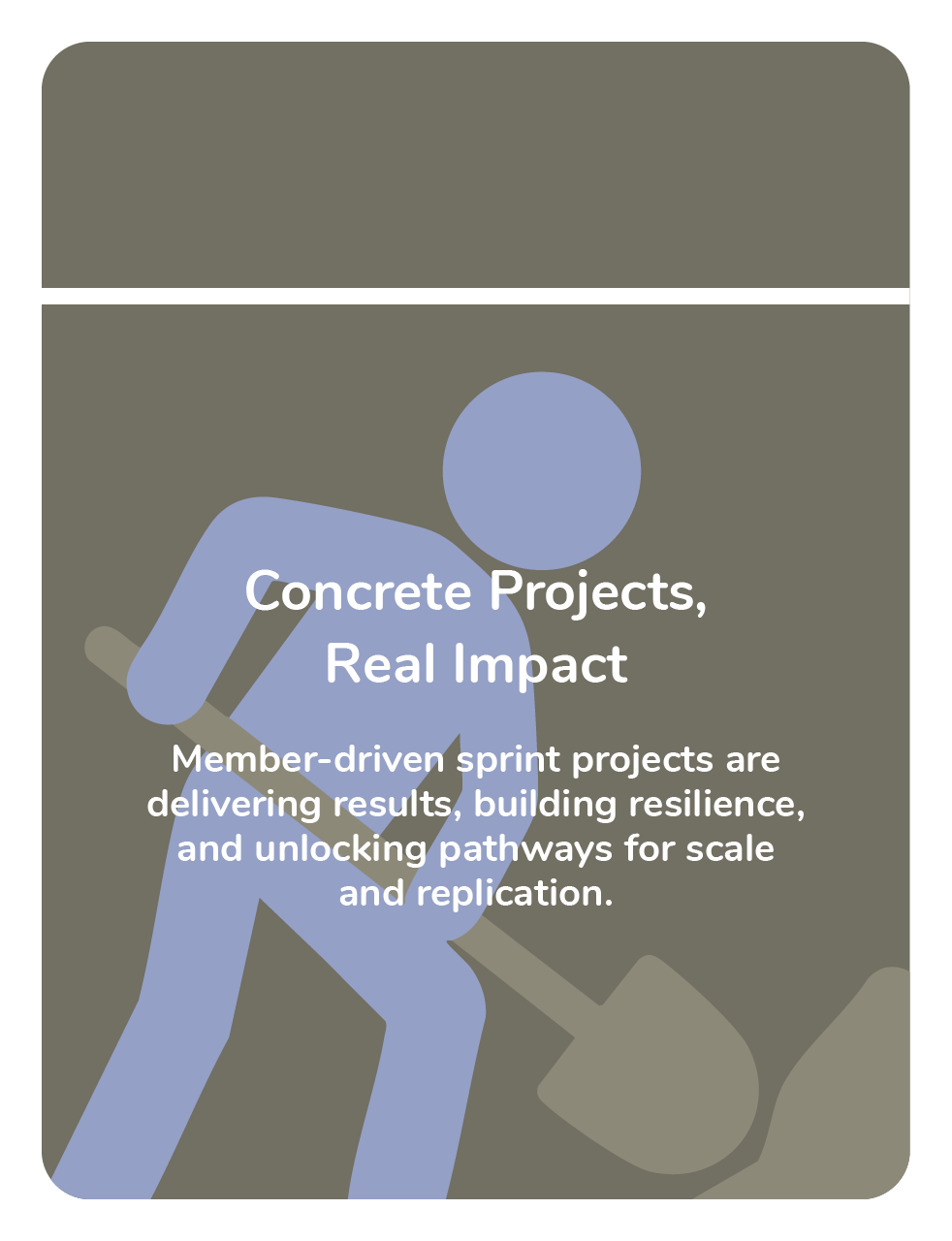

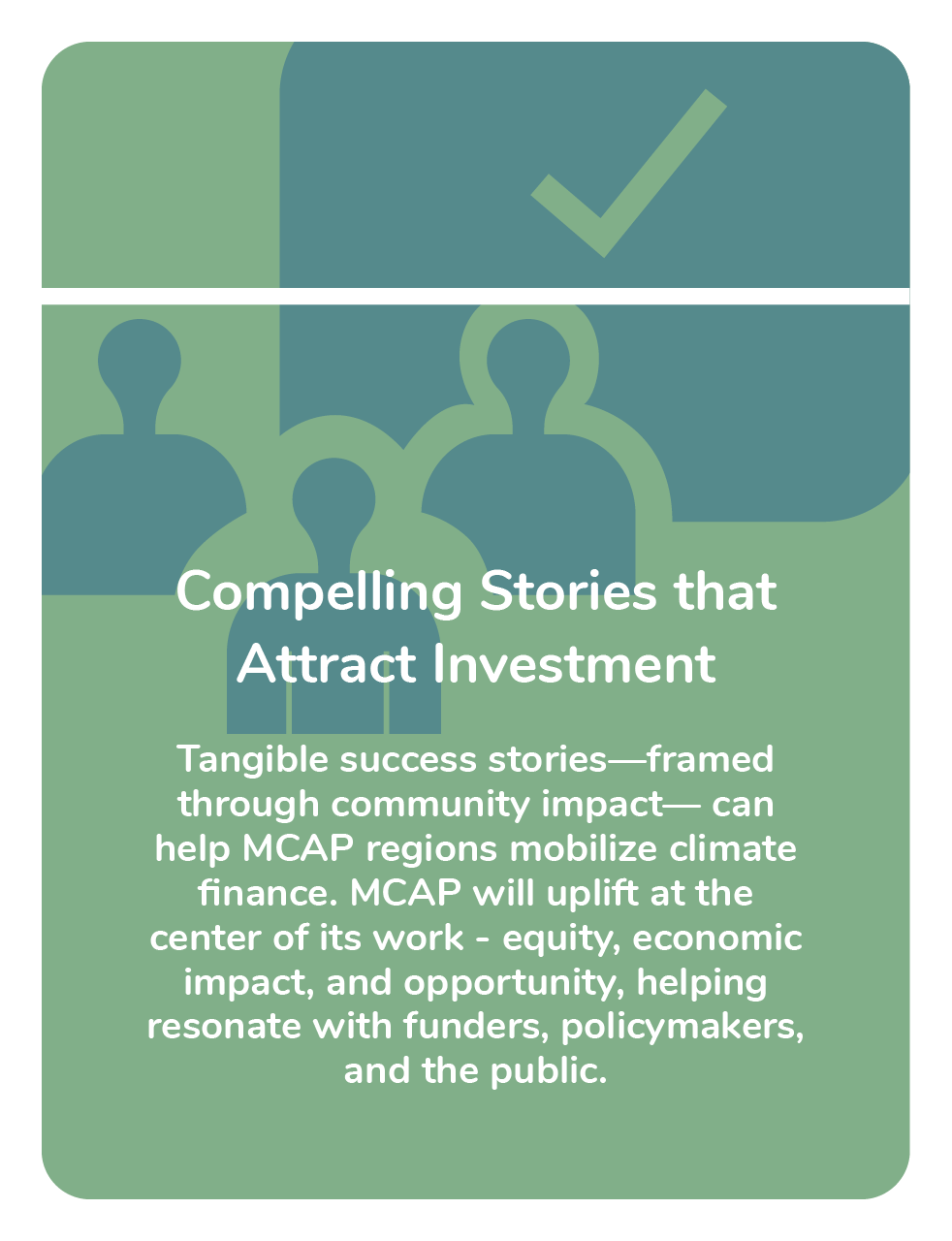
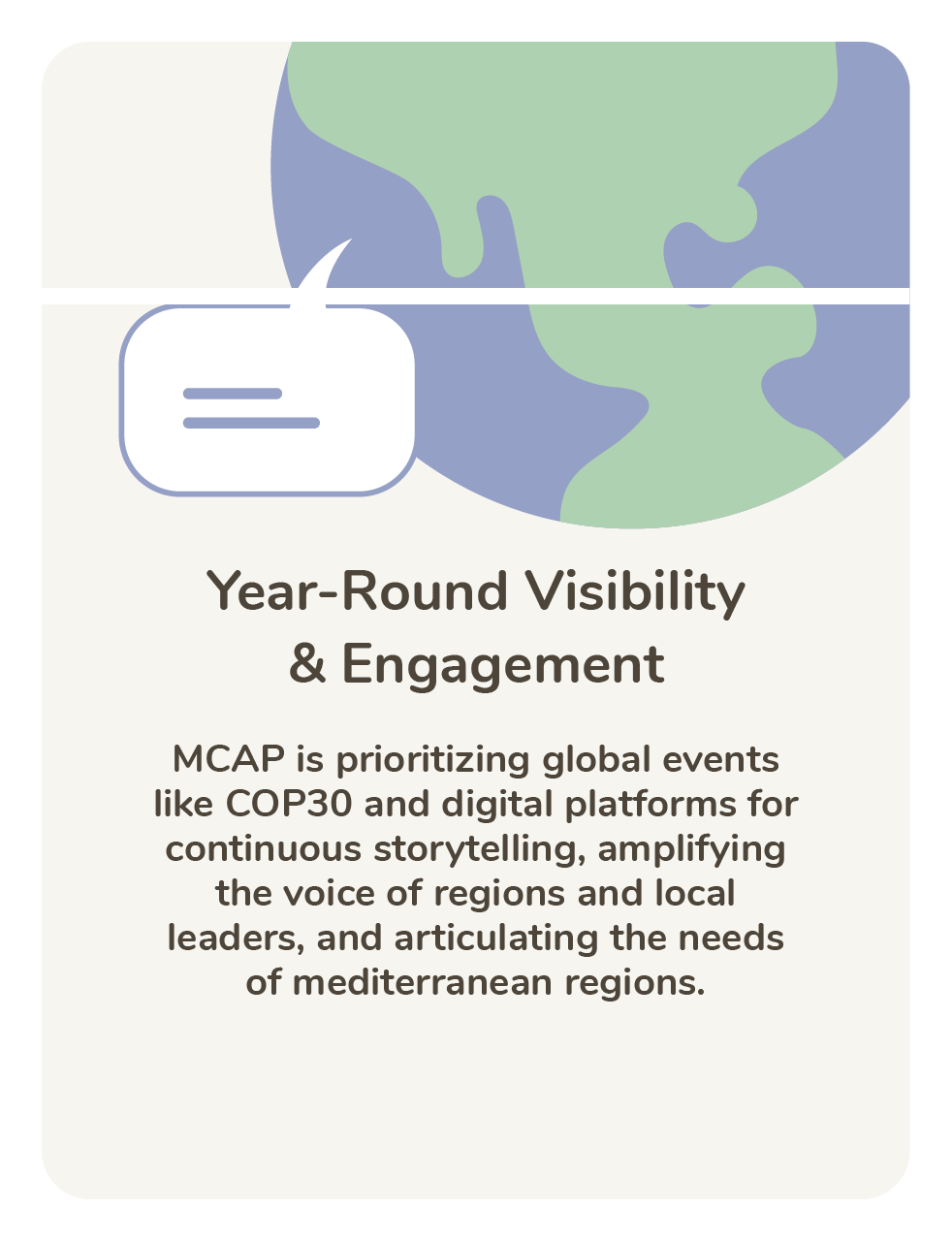
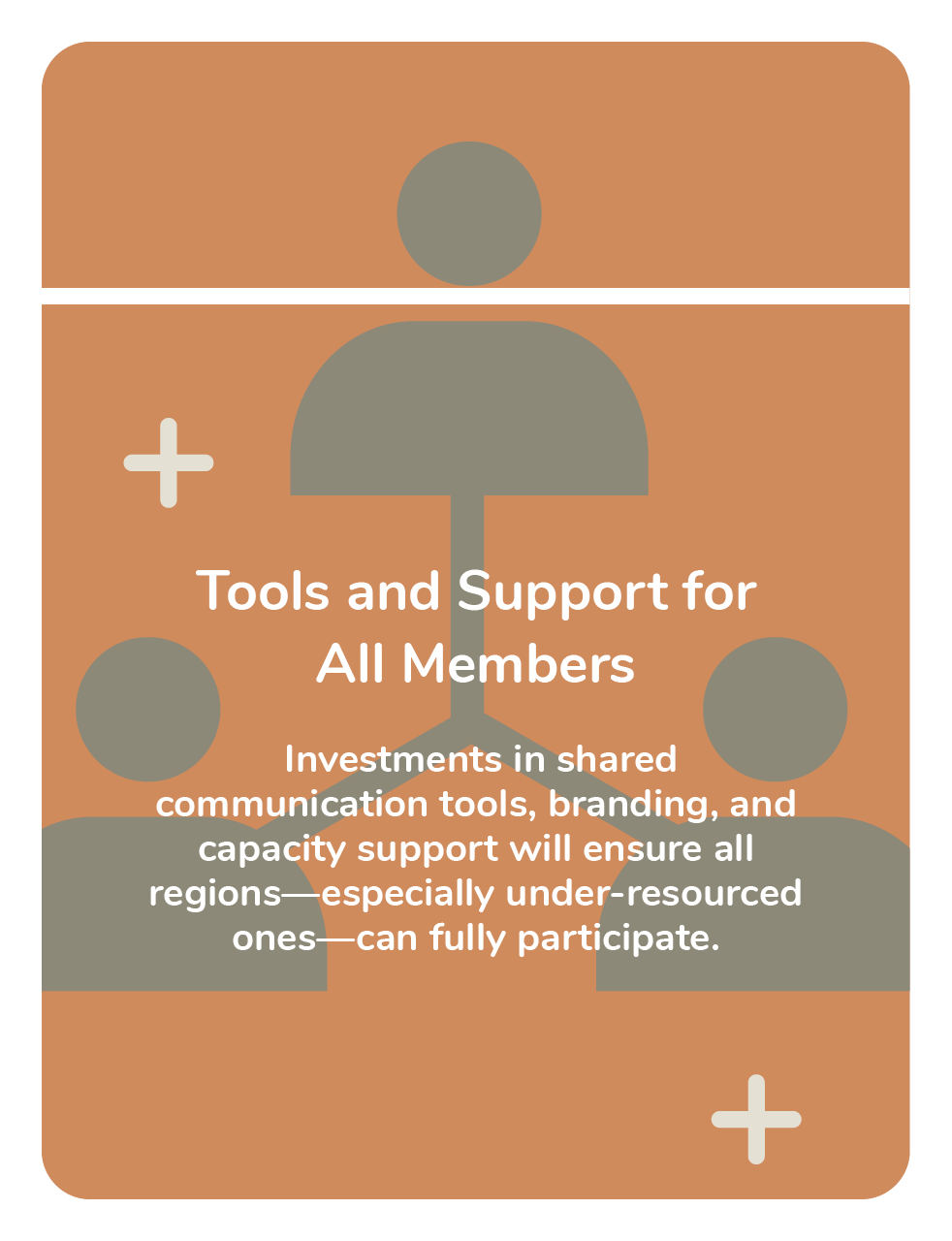
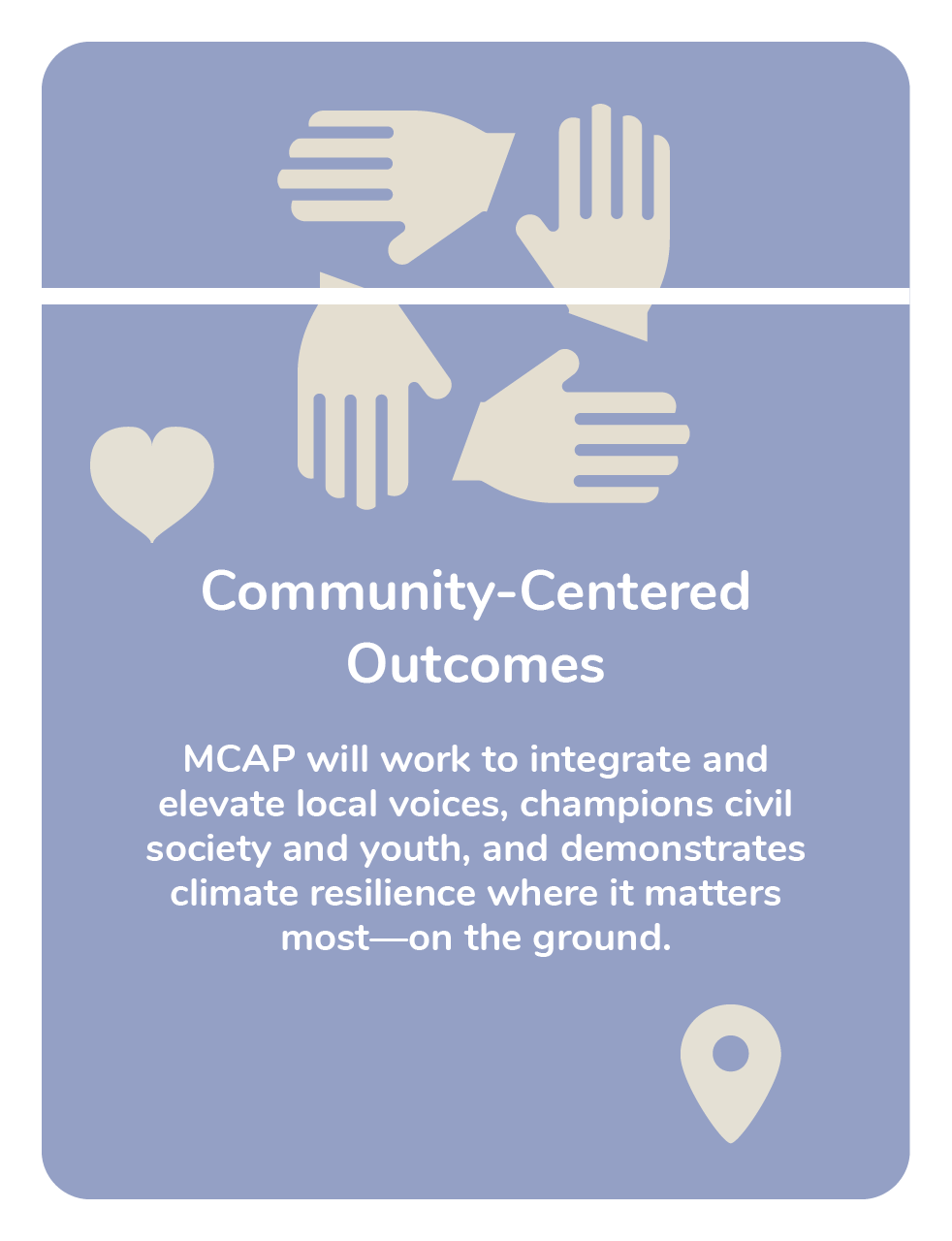
This convening was made possible by the generous support of the Gordon and Betty Moore Foundation and Conrad N. Hilton Foundation











